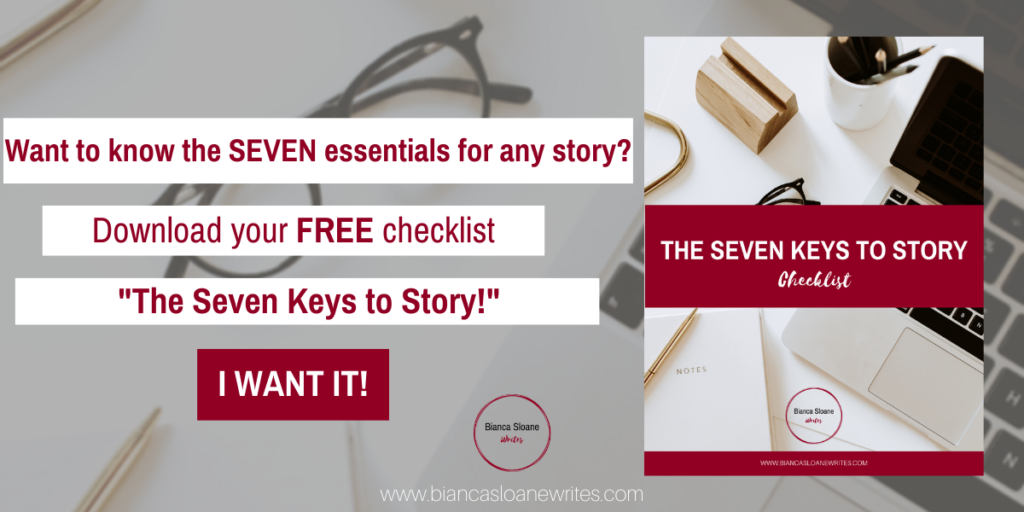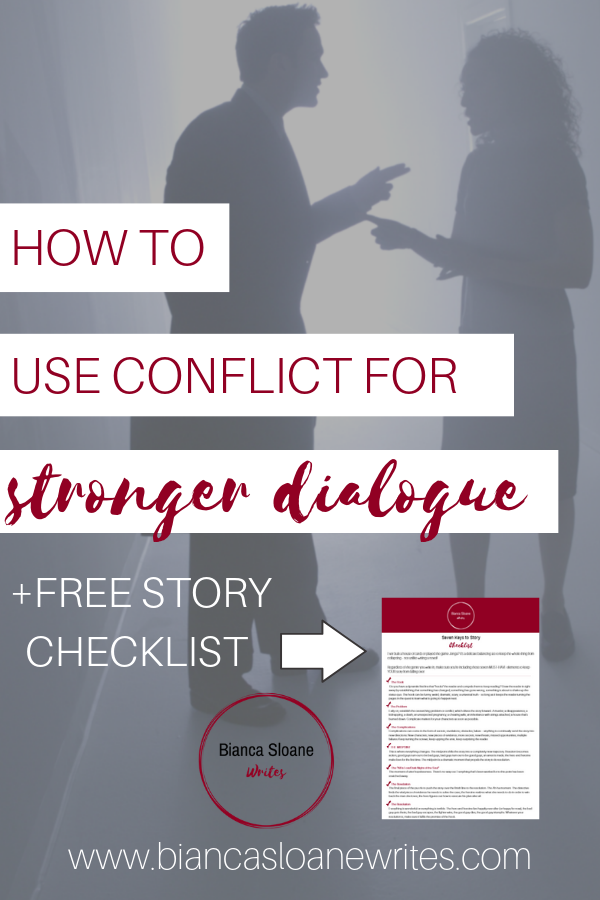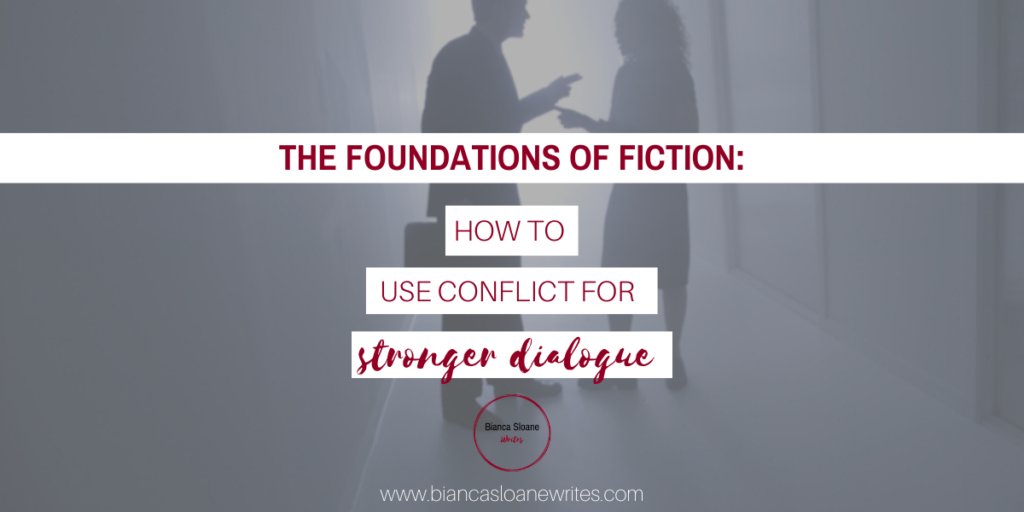Foundations of Fiction: How to Use Conflict for Stronger Dialogue
It has to be said . . . writing dialogue is hard (see what I did there?)
Why is dialogue so hard? For one, dialogue is misunderstood and as a result, misused. How many times have you had someone read a scene or a chapter of your work and the feedback is, “You might want to add some dialogue,” or “The dialogue needs work?”
Well, that’s great, except No. One. Ever. Tells. You. How. To. Write. Dialogue. (Much less how to make it stronger).
Which brings us to dialogue’s ACTUAL job:
- To propel the story forward
- To reveal character
It is NOT:
- A dumping ground for exposition
- A dumping ground for mindless chit chat
- Meant to sound too realistic
“Dialogue can be fun, but most people don’t study it.
Shane Black, screenwriter, Lethal Weapon
That’s it. So simple. Deceptively so. Which is exactly why dialogue gets the shaft, because it seems so easy. Just like character development, story structure, setting, and plot, dialogue is a major brick in your fiction foundation and its importance should NOT be underestimated.
Ever notice how the only time we pay attention to dialogue is when it’s brilliant – or awful?
Let’s strive for brilliance. 😉

So, what dialogue strategies should you use to propel your story forward, reveal character, avoid boring exposition, mindless chit-chit, and sounding too realistic?
There’s a few tricks you can put in your bag.
The first one we’ll examine in this Foundations of Fiction: Dialogue series is CONFLICT.
Your dialogue exchanges, no matter how small, should contain conflict. Simply put, your characters should be at odds with each other. One character should be doing something the other character doesn’t want them to do. One character should not be doing something another character wants them to do. One character has information another character wants. And so on.
Take note: conflict does NOT mean constant screaming matches between your characters. That’s exhausting for your readers. Not to mention your characters 😜
Conflict can take the form of an argument between a mother and her teenage daughter who has broken curfew. A police detective attempting to extract a confession from an unyielding suspect. A wife having an uncomfortable conversation with her husband about why she was really late for dinner. A man sidestepping his neighbor’s queries about the tools missing from his garage. A supervisor warning an employee about her poor work performance.
Here’s a conversation with Bob and Jane Blow about the weather. What jumps out at you about the exchange?
Bob Blow: They said on the news last night we’re supposed to reach a high of ninety today.
Jane Blow: I heard that. I’ll be sure to wear sunscreen while I’m out today.
Bob Blow: Don’t forget your sunglasses, too.
Jane Blow: Thanks for the reminder. I sure do hate when the sun gets in my eyes.
Bob Blow: You should probably wear that big floppy hat, too. The one you got in Mexico? Can’t be too careful in the sun.
Jane Blow: That’s true. I think it might be in the hall closet. I’ll have a look.
Bob Blow: You know, I think I’ll mow the lawn today.
Jane Blow: That’s a great idea. Thanks for doing that.
Bob Blow: Sure, of course.
Are you as bored as I am by Mr. and Mrs. Blow?
Let’s reimagine this conversation, but inject some conflict into the proceedings:
Bob Blow: They said on the news last night we’re supposed to reach a high of ninety today.
Jane Blow: Oh, wait, let me guess . . . this is your way of saying you don’t plan to mow the lawn. Again.
Bob Blow: I just told you it’s going up to ninety today. Way too hot to be pushing a lawn mower all over the place.
Jane Blow: Wasn’t too hot for you to play softball with your buddies yesterday when it was ninety-five out.
Bob Blow: Jeez. This again.
Jane Blow: Yeah, this. Again.
Bob Blow: I swear, if you don’t stop—
Jane Blow: You’ll what?
Bob Blow: You don’t want to know.
Jane Blow: And you don’t want to know what I’ll do.
Okay . . . now I’m listening. A simple observation about the weather has escalated to veiled threats between Mr. and Mrs. Blow.

How does an exchange like this propel the story forward? Mr. Blow might murder Mrs. Blow and bury her in that overgrown yard. Mrs. Blow might let the air out of Mr. Blow’s tires and in retaliation, he could hide all of her shoes, leading to all-out war. Mrs. Blow could leave Mr. Blow and go on a road trip of personal self-discovery. The story possibilities are endless.
And how does this exchange reveal character? Mr. Blow is lazy. Mrs. Blow is a nag. Mr. Blow prefers the company of his friends to his wife. Mrs. Blow isn’t afraid to back down from a fight. Mr. Blow likes to play softball, meaning he’s possibly athletic, or at least someone who enjoys the social aspects of playing recreational sports, so he could be an extrovert. Mrs. Blow is fed up with her husband’s lethargy.
All of that from one little dialogue exchange.
The Takeaway: Avoid subjecting your characters to mindless chit chat or mundane exchanges about the weather or what they had for dinner. Put them on opposing sides of an issue and don’t let the exchange come to a resolution. Leave a carrot dangling out there that compels the reader to turn the page to see where the next exchange between your characters leads. Keep amping up the conflict with each interaction until everything blows up.
What are some examples of conflict in dialogue that you’ve read or watched?


